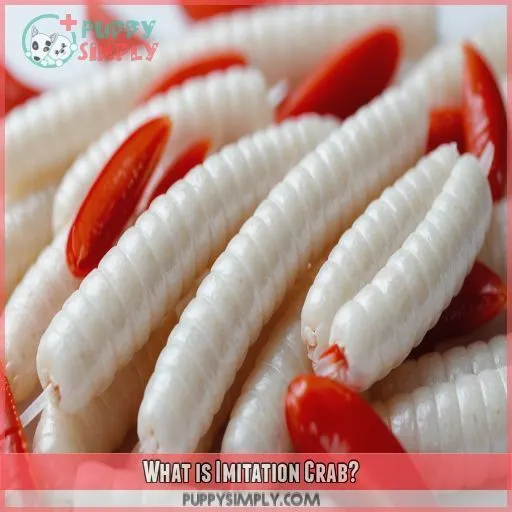This site is supported by our readers. We may earn a commission, at no cost to you, if you purchase through links.
 Thinking about sharing a taste of surimi (imitation crab) with your dog?
Thinking about sharing a taste of surimi (imitation crab) with your dog?
It’s better to think twice.
Even though dogs might give you those irresistible puppy eyes, surimi can be a wolf in sheep’s clothing for them.
It’s packed with sodium and additives that are anything but friendly to your pup’s tummy.
Risks include sodium poisoning and allergic reactions, which might have you and Fido making a quicker trip to the vet than to the beach.
So, save the surimi for yourself and offer your furry buddy a safer snack.
Stay tuned to learn more about safe seafood treats for dogs!
Table Of Contents
- Key Takeaways
- What is Imitation Crab?
- Can Dogs Eat Imitation Crab?
- Is Imitation Crab Safe for Dogs?
- Can Dogs Eat Real Crab?
- Health Benefits of Real Crab Meat for Dogs
- Risks of Crab Meat for Dogs
- How to Prepare Crab for Dogs
- Can Dogs Be Allergic to Imitation Crab?
- Surimi and Its Effects on Dogs
- Imitation Crab and Dog Nutrition
- Frequently Asked Questions (FAQs)
- Can dogs eat crab surimi?
- Is it okay to give dogs seafood sticks?
- Is surimi safe to eat?
- Can dogs be allergic to imitation crab meat?
- Can dogs eat imitation crab in moderation?
- What are the long-term effects of feeding dogs imitation crab?
- Are there any healthy alternatives to imitation crab for dogs?
- How can I tell if my dog is allergic to imitation crab?
- Is imitation crab a suitable training treat for dogs?
- Conclusion
Key Takeaways
- You might think sharing imitation crab with your dog is a fun idea, but it’s more like inviting trouble to dinner. The high sodium and additives in surimi are a fast track to digestive chaos or allergies. Better save the surimi for your own plate!
- Even a small nibble of imitation crab can have your pooch singing the blues with excessive thirst, vomiting, or lethargy due to sodium poisoning. It’s like ordering a one-way ticket to the vet’s office.
- Real crab meat has got the green light for your furry friend, but only if it’s cooked, shell-free, and served plain. Think of it as a seafood delight done right, keeping those tails wagging and those bellies happy.
- If you notice Fido itching like a disco fever gone wrong after sneaking some surimi, it might be allergies knocking at the door. Be the vigilant pet detective and consult your vet to keep your pup out of trouble.
What is Imitation Crab?
Imitation crab is a processed food made from surimi, a white fish paste that’s flavored to taste like the real thing. While it may seem like a budget-friendly alternative, it’s important to understand what goes into this imitation seafood before feeding it to your furry friend.
Ingredients Used in Imitation Crab
In imitation crab, a mix of ingredients transforms white fish into a crab-like delight, but not without additives. Here’s what’s commonly included:
- Surimi Fish Types: Typically, Alaskan pollock.
- MSG in Surimi: Enhances flavor.
- Food Coloring Impact: Adds that "crabby" look.
Difference Between Imitation Crab and Real Crab
Imitation crab and real crab are as different as apples and oranges. The main ingredients in imitation crab include surimi (fish paste), making it a cheaper, more uniform option. Meanwhile, real crab offers authentic taste and texture but can cause seafood allergies or intestinal blockage.
Nutritional Value of Imitation Crab
While imitation crab might trick your taste buds, it doesn’t fool dog nutrition. It’s a processed mix with low protein, high sodium, and additives that pose health concerns. Dog owners should know what sneaks into canine bowls isn’t always safe dog food, so spot check ingredients!
Can Dogs Eat Imitation Crab?
While imitation crab may seem like a tasty treat, it’s actually not a good idea to share it with your furry friend. Imitation crab contains high levels of sodium and other processed ingredients that can be harmful to dogs, potentially leading to serious health issues.
Risks of Imitation Crab for Dogs
While imitation crab might seem like a fun treat, it’s better to steer clear for your pooch’s sake. This surimi snack is packed with sodium and food additives like MSG, potentially causing digestive issues or allergic reactions. Stick to trusted dog food brands instead.
!
Signs of Sodium Poisoning in Dogs
Ever wonder if your pup’s taken a trip to the salty side? Sodium poisoning symptoms include excessive thirst, vomiting, and lethargy. Keep an eye on dog sodium levels, especially if surimi or potassium chloride snuck into their dish. Prioritize dog care and dodge potential dog allergies!
Effects of Disodium Inosinate on Dogs
Although Disodium Inosinate may sound like a high-brow food term, it’s simply an additive that can stir the pot of dog allergies. This innocuous-sounding ingredient might fizzle with your dog’s tummy, causing widespread discomfort. So, sprinkle caution when sharing surimi dog treats! Canines prefer simple chow.
Is Imitation Crab Safe for Dogs?
Imitation crab may seem like a tasty treat for your pup, but it’s actually not the best choice. While small amounts may not cause significant harm, the high sodium content and processed ingredients in imitation crab can pose serious risks to your furry friend’s health.
Why Imitation Crab is Not Recommended for Dogs
Imitation crab’s not great for dogs. With sodium levels higher than the doggie dance floor, MSG impact like a bad disco record, and additives dangers lurking, it’s a fish paste party to avoid. Try these instead:
- Surimi alternatives
- Cooked crab cakes
- Safe dog treats
Comparison With Real Crab Meat
You might think imitation crab’s the cat’s pajamas, but for dogs, it’s not. The real deal offers better taste and nutrition. Here’s a quick breakdown:
| Aspect | Imitation Crab | Real Crab |
|---|---|---|
| Taste | Artificial | Authentic |
| Nutritional Value | Lower | Higher |
| Safety | Risky additives | Cooked safely |
Precautions for Dog Owners
To keep your dog out of hot water, avoid imitation crab—it’s not worth the risk. High sodium and MSG could spell trouble for their health. Choose real crab, cooked and shell-free, in small portions. Remember, even man’s ancient hunting partner deserves good nutrition!
Can Dogs Eat Real Crab?
While dogs can enjoy the benefits of real crab meat, such as lean protein and essential nutrients, it’s really important to prepare it safely. Cooked crab meat without shells or seasonings is the way to go – raw crab can pose risks like parasites and choking hazards.
Benefits of Real Crab Meat for Dogs
While imitation crab isn’t a great choice, real crab meat can be a delightful protein source for your pup. Loaded with omega-3s and essential minerals, it’s like a seafood jackpot for their diet. Just make sure it’s cooked and shell-free—no shellfish surprise parties!
Risks of Raw Crab Meat for Dogs
While real crab meat offers fantastic benefits, raw crab’s got its pitfalls. It’s a shell game with parasites lurking, shell dangers, and a real choking hazard that’ll rattle Fido’s collar. High iodine levels could lead to digestive upset. Better safe than sorry, right?
Safe Preparation Methods for Dogs
You’ve got your crab ready, but hold your horses! Crab safety for dogs is key. Cook it thoroughly by boiling or steaming, then remove every pesky shell bit. Serve it plain, maybe as a food topper or frozen in a Kong treat. Bon appétit, pup!
Health Benefits of Real Crab Meat for Dogs
If your pup loves seafood, you’ll be happy to know that real crab meat can provide a nutritious boost. Packed with lean protein, omega-3s, and essential vitamins and minerals, crab can be a tasty and healthy treat for your canine companion.
Protein Content in Real Crab Meat
Crab meat packs a punch with its high protein content, almost comparable to fish or chicken. Consider it a super fuel for your dog’s growth and weight maintenance. Just make sure it’s cooked, served in moderation, and don’t let them get too crabby—pun intended!
Omega-3 Fatty Acids in Real Crab Meat
You probably know Omega-3s are great for humans, but they’re also beneficial for dog health. Real crab meat provides:
- Inflammation reduction in joints.
- Shinier coats with less shedding.
- Brain support for aging dogs.
- Heart health, reducing disease risk.
Crab vs. fish for the win!
Essential Vitamins and Minerals in Real Crab Meat
Besides omega-3s, crab meat packs a punch with vitamins like B12 and minerals such as zinc. Its like a multivitamin on a plate! While healthy crab can boost your dogs diet, make sure every serving is shell-free to avoid turning snack-time into an unexpected trip to the vet.
Risks of Crab Meat for Dogs
While crab meat can provide valuable nutrients for your pup, it also poses some risks. Crab’s high sodium content and the potential choking hazard from shells can spell trouble for your canine companion. It’s important to prepare crab carefully to keep your furry friend safe and healthy, especially since sugar’s impact on dogs can be significant.
.
High Sodium Content in Crab Meat
While crab meat offers nutritional perks, its high sodium content can spell trouble for your dog’s health, like a salty villain wearing a seafood disguise similar to McDonald’s fries.
. Keep Fido safe by remembering:
- Sodium-rich foods are risky.
- Practice moderation in dog diets.
- Explore crab meat alternatives.
Choking Hazards From Crab Shells
Crab shells are like tiny, crunchy landmines for your dog’s throat. These sneaky culprits pose serious dog choking hazards. To prevent choking, always remove crab shells before feeding. Remember, a dog’s not a crab cracker, so prioritize safety with these shell safety tips!
Intestinal Blockage From Crab Shells
Crab shells are notorious for causing dog-intestinal-blockage havoc. They’re like sneaky ninjas your pup doesn’t need. Watch out for:
- Crab shell size – avoid tiny fragments.
- Shell ingestion risk – it spells trouble.
- Dog choking hazards.
- Shell removal tips – go shell-free!
Vet advice needed if issues arise.
How to Prepare Crab for Dogs
If you want to safely feed your pup some crab, it’s important to properly prepare it. Thoroughly cook the crab meat, remove any traces of the shell, and serve it plain without any seasonings or additives.
Cooking Methods for Safe Consumption
Boiling, steaming, or baking are the safest crab cooking tips you can follow. These methods help to prevent harmful bacteria and make the crab safe for your dog. Just remember, always let it cool down first unless your dog enjoys molten lava cuisine! Crab meat safety starts with careful cooking.
Removing Shell and Seasonings
Before serving crab to your pup, focus on safe crab prep by removing all shells. Think of crab shells as tiny landmines—dangerous for Fido’s tummy! Stick to dog-friendly recipes, skipping seasonings. Look into seasoning alternatives that won’t upset your furry friend’s stomach.
Serving Suggestions for Dogs
Transform crab into tempting dog-friendly treats by simply mixing it with rice for a healthy crab meal. It’s straight from your kitchen to their heart! Just keep things plain—no salt or seasoning. Make crab for picky eaters fun by freezing it in Kong toys!
Can Dogs Be Allergic to Imitation Crab?
While imitation crab may seem like a tasty treat, it’s important to be aware that your furry friend could potentially be allergic to the ingredients. If your dog exhibits signs of an allergic reaction after consuming imitation crab, it’s best to consult your veterinarian for proper treatment and guidance on avoiding this potential allergen in the future. Hair loss around eyes can be a symptom of allergies in dogs, so it’s important to be aware of potential triggers.
.
Common Allergens in Imitation Crab
Your pup might just be allergic to imitation crab. Many dogs have fish allergies, or shellfish sensitivities. Imitation crab often contains MSG, which can trigger reactions. Keep an eye out, because even dinner scraps could turn into a surprise game of "what’s causing that itch?
Signs of Allergic Reactions in Dogs
Imagine your dog sneezing like a tiny tornado! Allergic reactions to imitation crab can be sneaky. Keep an eye out for these signs:
- Skin rashes and itching: Like a bad fur day gone worse.
- Vomiting or diarrhea: Doggy tummy troubles.
- Sneezing and coughing: Frequent, like a pup with hay fever.
Treatment Options for Allergic Reactions
If your dog reacts to imitation crab, don’t panic. Antihistamines can help with minor symptoms but consult your vet first. Severe cases might need steroids or an EpiPen — yes, like humans. Emergency care is essential, and a quick vet consultation is your safest bet!
Surimi and Its Effects on Dogs
Surimi, the fish paste used to make imitation crab, can pose risks for your canine companion. While it may seem harmless, the processed ingredients in surimi can upset your dog’s stomach and lead to unpleasant side effects.
What is Surimi Made Of
Let’s take a closer look at surimi, think of it as the undercover agent of the seafood world.
Made from fish like pollock, surimi is crafted into a paste that’s smooth as a well-told joke.
It undergoes processing methods that add texture and flavor, creating something crabby without the actual crab.
But not all that glitters is gold, right?
Always check those surimi ingredients if you’re feeding your pup!
Risks of Surimi for Dogs
You might think your dog enjoys surimi, but it’s not exactly the gourmet treat they’re craving. Surimi contains additives that may lead to digestive issues or even allergic reactions in your four-legged pal. Keep a lookout for:
- Sodium poisoning symptoms like vomiting or diarrhea
- MSG effects, causing possible headaches or restlessness
- Additives concerns leading to skin irritations
- Digestive issues from high salt content
- Allergic reactions making Fido uncomfortable
Imitation Crab and Dog Nutrition
If you’re considering sharing imitation crab with your pup, it’s important to remember that dogs’ nutritional needs are different from ours. While imitation crab might make a delicious addition to your sushi, Fido’s tummy mightn’t appreciate the salty impostor.
Comparison With Other Protein Sources
If you’re thinking about your pup’s nutrition, imitation crab may not be the best choice. Compared to real protein sources like chicken, fish, or beef, imitation crab lacks the essential nutrients dogs need. While it may seem like a cost-effective option, your furry friend will thrive better on whole, high-quality proteins. Keep their health in mind when selecting their meals.
| Protein Source | Nutritional Value | Cost |
|---|---|---|
| Chicken | High in protein, low in fat | Affordable |
| Fish | Rich in omega-3s, protein-packed | Moderate |
| Beef | Excellent source of iron, zinc | Higher cost |
| Imitation Crab | Lacks essential nutrients | Budget-friendly |
Recommendations for Dog Owners
Now that you’ve got a grip on protein sources for your pup, let’s talk strategy! Remember, dogs can’t always handle crab drama.
- Avoid Imitation Crab: Surimi risks outweigh benefits, with its sodium and additives. Opt for safer dog food alternatives.
- Choose Real Crab Wisely: Only cooked, shell-free meats are safe and keep allergies in check.
- Consult Your Vet: They’re your best ally in dog nutrition and crab meat safety.
Frequently Asked Questions (FAQs)
Can dogs eat crab surimi?
Feeding your dog crab surimi is like choosing processed over natural. It’s packed with sodium and additives, not ideal for pups. Stick to real, cooked crab meat without shells if you want your dog to enjoy seafood.
Is it okay to give dogs seafood sticks?
You’d think seafood sticks are a treat, but they’re a no-no for dogs. Packed with sodium and additives, they can upset your pup’s tummy. Stick to dog-safe treats instead and keep your furry friend wagging!
Is surimi safe to eat?
Eating surimi is safe for humans—it’s a low-fat protein source with omega-3s. Just watch out for added sodium and preservatives. Think of it as the budget-friendly cousin in your seafood lineup—cheap, cheerful, and versatile.
Can dogs be allergic to imitation crab meat?
Yes, dogs can be allergic to imitation crab meat. The artificial ingredients like carmine, MSG, and preservatives in imitation crab can trigger allergic reactions in some pups, causing skin irritation, digestive issues, and even respiratory problems. (Source)
Can dogs eat imitation crab in moderation?
Feeding your dog imitation crab is like playing with fire; it mightn’t burn immediately, but it’s risky. The cocktail of processed ingredients and sodium isn’t worth it. Stick to dog-safe treats for peace of mind.
What are the long-term effects of feeding dogs imitation crab?
Feeding your dog imitation crab regularly is like inviting health issues to dinner, especially if they’re a French Bulldog with unique coloring.
. It lacks essential nutrients, causes high blood pressure, dehydration, obesity, and can lead to allergies. Skip the fake crab for long-term canine health! .
Are there any healthy alternatives to imitation crab for dogs?
Think of surimi as a mere understudy when your dog’s tastebuds deserve a star. Opt for cooked, plain chicken or turkey, packed with lean protein. It’s like giving them a first-class ticket to Flavor Town, safely!
How can I tell if my dog is allergic to imitation crab?
If your pup starts showing signs like vomiting, diarrhea, or skin irritation after eating imitation crab, they may have an allergy. Play it safe and steer clear of this fishy imposter – your dog’s health is too important to risk!
Is imitation crab a suitable training treat for dogs?
Feeding imitation crab to dogs as a treat is like tossing them a curveball. It’s packed with unhealthy sodium and additives. Stick to safer, dog-friendly treats and keep your furry friends’ health on the front burner like apple slices or blueberries.
!
Conclusion
While surimi might be your snack of choice on a beach day, it’s not the best treat for your dog.
The risks, like sodium poisoning, outweigh the potential benefits, making surimi a "no-go" for dogs.
Instead, opt for real crab meat if you’re keen on sharing seafood.
By preparing it properly—removing shells and avoiding seasoning—you’ll keep your furry friend safe and happy.
















